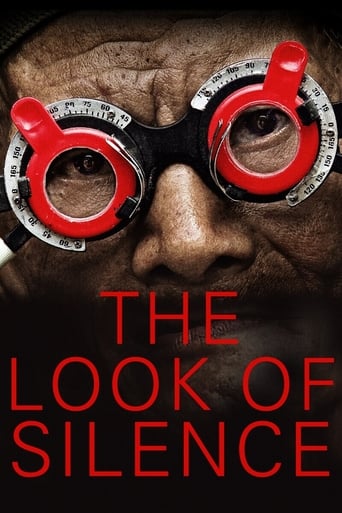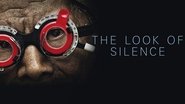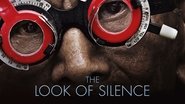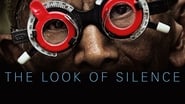room102
Nominated for an Oscar for Best Documentary in 2015This is a sequel/companion documentary to THE ACT OF KILLING (2012) about the genocide in Indonesia, this time seen from the POV of the family whose one of its members been murdered.Everything about this is strange. From the calmness of the people talking about the killings, to the calmness of the members of the victim's family. It's like everything is either trivial or told from a distance.Plus, there is the strange situation of people talking about forgetting and forgiveness, while obviously remembering everything and basically threatening the brother. Again, very strange feeling throughout the entire movie.Like the previous film, there is a strange feeling of trivializing genocide and brutally murdering of people. I thought the first movie was better constructed. This film feels like bits and pieces of interviews without a real coherent structure.
eddie_baggins
A companion piece to his haunting and unique 2013 Oscar nominated documentary The Act of Killing, Joshua Oppenheimer's The Look of Silence may not have the same gut wrenching impact of his first Indonesian set tale but it's still a highly insightful and quietly powerful look at the after effects of Indonesia's mass killings in the 1965 Communist round ups.Where The Act of Killing focused its attentions largely on Anwar Congo and his fellow death squad members who were responsible for countless murders of their fellow countrymen, The Look of Silence turns its attentive gaze towards average every day optometrist Adi Rukun and his quest to find those that played a part in the brutal murder of his convicted communist brother Ramli.It's a much more straight forward tale than Killing that became something of a fever dream thanks to its subject's willingness to re-enact and portray their experiences through bizarre home made movies and scenarios that had to have been seen to be believed. Oppenheimer this time around sits his camera on subjects and doesn't shy away from the silence of the film's title where questions are raised and eyes and facial expressions say more than words ever could.Rukun himself is also a likable presence and the way in which he deals and interacts with those that were involved with his brothers demise are the film's most powerful. He asks thoughtful and loaded questions and refrains from letting anger get the better of him and Oppenheimer never shy's away from allowing the story to play out without fanfare or manipulation and the true atrocities of what occurred in the beautiful countryside of Indonesia is never too far away from view even if this is very far from being a history lesson in the events.A finely made compatriot of the Act of Killing that would make for a great double bill with its more accomplished forefather, The Look of Silence is not entertainment but it's an important and effective study on war, loss and family and another reason to suggest that Oppenheimer is one of the world's most interesting documentary filmmakers.3 ½ self-illustrated books out of 5
Sledge Hammer
This documentary is first of all, the visceral fermentation of a man that can withhold and suppress any retributive feeling, with almost zen-like attitude, while his eyes humidify with utter contempt as he stares into the face and gestures of his brother killers gone old ... and doing quite well. Directly or indirectly, he's just formulating the questions that in most cases seem nonsensical to the perpetrators of the mass killings that took place in the 60' Indonesia. The real tragedy unfolds as the footage unveils fully towards the end, because u realise that there is no action that Adi, or any of us could take, except forgiveness, against people that never even formulated in their own language, the concept of morality. It's like looking at some grumpy old man talking about a high-school "beef", back in the days, with the "commies", that ended a bit sour ... Except the sourness of that "beef" is counted in the slaughter of human lives, that never got redeemed, apologized for, or felt any regret about them. It's not even really about religious or political indoctrination, but definitely it's a documentary about the versatile human nature that set's us apart so much one from another, to the extent where one can legitimately ask : Ar we even belonging to the same species? Endure, all you that feel compassionate about the world.
MortalKombatFan1
"The Look of Silence" is a companion piece to Joshua Oppenheimer's previous film "The Act of Killing". Both films deal with the mass murder of communists in Indonesia between 1965 and 1966 - a serious crime resulting in the deaths of over a million innocent people by the hands of hired militia sanctioned by the government, but has gone unnoticed in the public eye for so long because the perpetrators are still at large, hailed as national heroes for stopping a revolution and in positions of power in government for over fifty years, living peacefully among the families of those they murdered."Act of Killing" is more audacious in style, following three killers as they recreate their murders for film in any genre they want (gangster flick, musical, etc.) - all the while they're boastful of their accomplishments, without any remorse or regret for their actions.'This film follows Adi Rukun, an optometrist who's brother was murdered in the genocide. We see him confronting death squad leaders and those who knew his brother, looking for some sort of understanding and possibly reconciliation for his murder. There are also domestic scenes with his mother and father, as well as with his wife and family. Life plays out happily before our eyes, but beneath it there are still painful reminders of the past when Adi talks about his brother with his mother, or when he tells his wife what he's been up to, talking with these killers they know. She says she would have stopped him if she knew, that his life could be in danger if he keeps digging up the past instead of forgetting. This gives the interviews a very real sense of tension, and you wonder if such a film could be made if it weren't for the involvement of outsiders who could be there with Adi.Still, Adi puts up a strong front, asking why they did what they did. The answer's usually the same, they deny individual responsibility, or say that it was necessary. Sometimes their answers are disturbing, saying that they drank the blood of their victims to stay sane. Family members of the now-deceased murderer of his brother deny knowing anything about their father's work. In a very affecting scene, Adi's uncle, a prison guard in the army says he was unaware what happened to the detained after they were shipped off onto trucks each day. He's trying to keep up a strong resolve, but you can see the pain in his face when he talks about the past.This film director chooses not to intrude on the telling of the stories with narration, but instead lets the interviewees tell their version of events, leaving pregnant pauses between answers to linger on their faces, which often tell more than spoken words ever could.It's a very quite, slow film, but I found it hypnotic and a damning portrait of a country's silence after horrendous acts were committed. Adi gives a voice to the families of many victims, and both films should be watched by everyone to get a better understanding of the depths humanity can sink to, and how a nation struggles to cope with long dormant pain after government sanctioned genocide.






